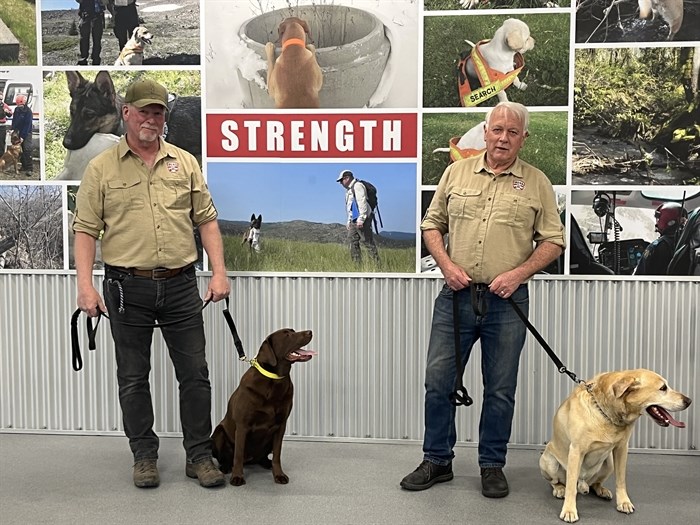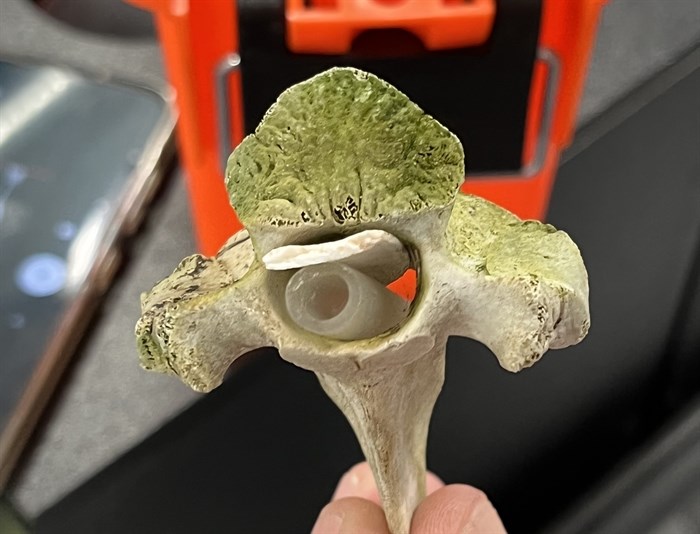
Retired critical care flight paramedic Randy MacLeod (left) stands with retired search and rescue professional Mike Ritcey with their trained search dogs at the Search, Recovery and Detection K9s of BC in Kamloops.
(SHANNON AINSLIE / iNFOnews.ca)
June 24, 2024 - 7:00 AM
A dog training centre in Kamloops was busy this week when iNFOnews.ca stopped by to meet the search experts running it and watch their two very skilled dogs sniffing out narcotics and items scented with human remains.
Operator Mike Ritcey has almost five decades of search and rescue experience. He's logged hundreds of hours searching for missing persons alongside his trusty companion Ranger, and found the remains of several missing people over his career.
“Kamloops is a target rich environment, we have so many people missing here,” he said.
The Search, Recovery and Detection K9s of BC is located on Kamloops’ North Shore and opened last year. The focus is on solving missing persons cases that have gone cold, using highly-trained cadaver dogs.
“The purpose isn’t to be a search and rescue organization that gets tasked out by RCMP, but to work separately on solving cold cases with dogs trained to find human remains.”
Working along side Ritcey is Randy MacLeod, a retired critical care flight paramedic with four decades of experience locating and medically attending to people in the backcountry. He has been training his dog Mara as a search dog and she is very skilled.
Both men are very busy for being retired. The pair, and their dogs, have been voluntarily searching the backcountry for missing people in the province, including Shannon White and Ryan Shtuka in Kamloops, Miguel Mack and Ben Tyne in Merritt.
They are pushed by the need to support families.
“Cases are sitting around getting cold,” Ritcey said. “The police say it’s an active file but it’s not active, it’s open and there’s a big difference. We meet with the family of these people and you just have to talk to a couple of them to see how devastated they are that nobody is looking. Your child disappears, what do you do, who do you call?”
The K9 Recovery Centre has a board of directors, and Ritcey said the organization is growing and includes experienced cadaver dog professionals from Vernon, Cranbrook and Dawson Creek who meet up to do training and searches.
Items used to train the dogs include human placentas, dirt collected from decomposing bodies and various drugs.
Both Ranger and Mara showcased their skills for iNFOnews.ca, finding cocaine in a couch, marijuana under a table and a bone with the scent of human remains hidden in a box among other boxes of animal bones. Upon finding the items, the dogs sat down and barked.

This animal bone with an item covered in human scent is used for training dogs at Search, Recovery and Detection K9s of BC in Kamloops.
(SHANNON AINSLIE / iNFOnews.ca)
“This is from a backbone of a deer but that little tube in there has human remains scent on it,” Ritcey said, holding up a bone. “We put out a whole bunch of bones and Ranger will smell them and indicate on that one. Out in the bush they can tell the difference between animal and human bones.
READ MORE: Family of missing Merritt murder victim overwhelmed with rumours, questions
“Ranger has found human remains out in the bush. He’s found deceased people and parts of deceased people. People don’t last long out there, they get parted out be animals really quick,” he said.
Not every dog is suited as a search dog. They have to have a high drive and get along with a team.
“It’s easier to bring a dog down than up and you can’t have a couch potato dog, you want a dog that can go all day,” MacLeod said. “Ranger doesn’t have a turn off switch. Mara is calm and does her job when she is told to. More aggressive dogs can be phenomenal working dogs but that doesn’t work with a search team.”
READ MORE: Why we really need you to sign up to our newsletter
While the dogs can be validated for drug detection certification by the RCMP, there isn’t a place in the province to validate them as cadaver dogs.
“People who have dogs that need validation in cadaver work have to go the states, and the training isn’t conducive to how things work here,” Ritcey said. “They’ll train dogs to go sniff things out in buildings, but we’ll never do that in real life here, it’s forensic work which is done by the RCMP. We want to train our dogs to be out in the bush and alert us when there are human remains.”
Ranger is validated as a drug detection dog and Mara is working on getting her validation.
READ MORE: National missing person cold case team working on Ryan Shtuka, Shannon White disappearances
The building the centre is in was donated by the Cooper Family Foundation and it also covers the rent. The centre doesn’t receive any government funding, so Ritcey and MacLeod rent the space for obedience dog training classes to “keep the lights on” in the building, but donations are needed.
“One human remains dog comes from Vernon but the travelling expenses aren’t covered,” MacLeod said. “We need donations to help us offset fuel. When we have extra money, we can go out and do more searches.”
Go here for more information about Search, Recovery and Detection K9s of BC, the cases they are working on and how to donate.
To contact a reporter for this story, email Shannon Ainslie or call 250-819-6089 or email the editor. You can also submit photos, videos or news tips to the newsroom and be entered to win a monthly prize draw.
We welcome your comments and opinions on our stories but play nice. We won't censor or delete comments unless they contain off-topic statements or links, unnecessary vulgarity, false facts, spam or obviously fake profiles. If you have any concerns about what you see in comments, email the editor in the link above. SUBSCRIBE to our awesome newsletter here.
News from © iNFOnews, 2024